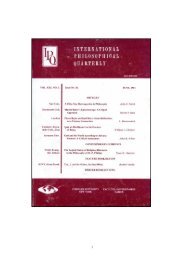The young hegel - Karl Marx Studies
The young hegel - Karl Marx Studies
The young hegel - Karl Marx Studies
You also want an ePaper? Increase the reach of your titles
YUMPU automatically turns print PDFs into web optimized ePapers that Google loves.
philosophy reflected an ‘aristocratic’ and irrationalist theory of knowledge that enabled only a<br />
few geniuses to obtain truth, understanding and insight. This followed from his ‘aristocratic’<br />
theory of society. While the immediacy of intellectual intuition led Schelling to turn his back<br />
on history, his destructive dialectics severely limited his conception of the absolute and thus<br />
the richness and vital character of life. With Hegel on the other hand, dialectics developed in<br />
tandem with the growth of his historical consciousness and general political attitudes. It is not<br />
a case of social and political differences being created from the diverging philosophical<br />
pathways for Lukacs, but the reverse — the roots of the breach lay in fundamentally opposite<br />
social and political values to begin with. Despite this changing of gears once again to a<br />
pseudo materialism, Lukacs convincingly proves his point, the method of Hegel’s<br />
Phenomenology clearly develops out of his attack on Schelling’s philosophy.<br />
In the critique that he made of Hegel’s dialectical method and philosophy in his Economic<br />
and Philosophical Manuscripts, the <strong>young</strong> <strong>Marx</strong> said that the Phenomenology was “the true<br />
point of origin and secret of the Hegelian dialectic”. Nowhere in this crucial study, however,<br />
does <strong>Marx</strong> indicate that Hegel’s masterpiece contained an overall dialectical movement that,<br />
in Lukacs’ words “goes on behind the back of the various configurations of consciousness”; a<br />
movement, furthermore, containing a duality whereby the subjectivity of the configurations<br />
appear within a silent background of the objective categories of reality. This discovery of a<br />
mute objectivity in Hegel by Lukacs soon after having read <strong>Marx</strong>’ own philosophical critique<br />
of 1844 with its clear and uncomplicated contrasting of the Hegelian Absolute as an entity of<br />
mind with “real corporeal man... with his feet firmly planted on the solid ground” seems<br />
strange. In fact, it seems as though Lukacs is continually engaged in rendering worldly the<br />
<strong>young</strong> Hegel’s phenomenology of spirit, forever drawing it down to the objectivity of<br />
substance, to materialism. One is left wondering how he could have minimised a key point<br />
<strong>Marx</strong> made in his critique that the reappropriation of estrangement in the motion of Hegelian<br />
spirit occurred only within consciousness.<br />
Some observers have remarked in connection with Lukacs’ work in general that he<br />
Hegelianises <strong>Marx</strong> - this may be true and is a process that can be observed at work at odd<br />
intervals in this study. More important perhaps is that Hegel’s thought is strangely brought<br />
towards materialism. But this does not detract for one moment from the true greatness of the<br />
Phenomenology and the world historical importance of its contribution to the march of human<br />
knowledge. It was merely Lukacs’ fate to write about the philosophy of others even though<br />
there are those today who hail him as an original thinker. In a Note on Hegelian philosophy<br />
that he appended to his Doctoral Dissertation, the <strong>young</strong> <strong>Marx</strong> noted that from the evolution<br />
of a school of philosophy and its fragmentation,<br />
“there also emerge a number of subordinate, querulous formations without individuality.<br />
Some of them place themselves behind a philosophical giant of the past - but the ass is<br />
soon detected under the lion’s skin; the whimpering voice of a manikin of today or<br />
yesterday blubbers in comical contrast to the majestic voice resounding through the ages...<br />
whose unwelcome organ it has appointed itself.”<br />
A historical judgement; nonetheless, this is a stimulating book that will certainly provoke<br />
much thought in the serious-minded student of philosophy by virtue of its lucid and qualitied<br />
analysis, well brought out by Rodney Livingstone’s excellent translation. Less impressive is<br />
the methodological idealism of its author who in his quest for truth has constructed a<br />
somewhat dubious reality.<br />
London<br />
England<br />
6<br />
L. Baronovitch




